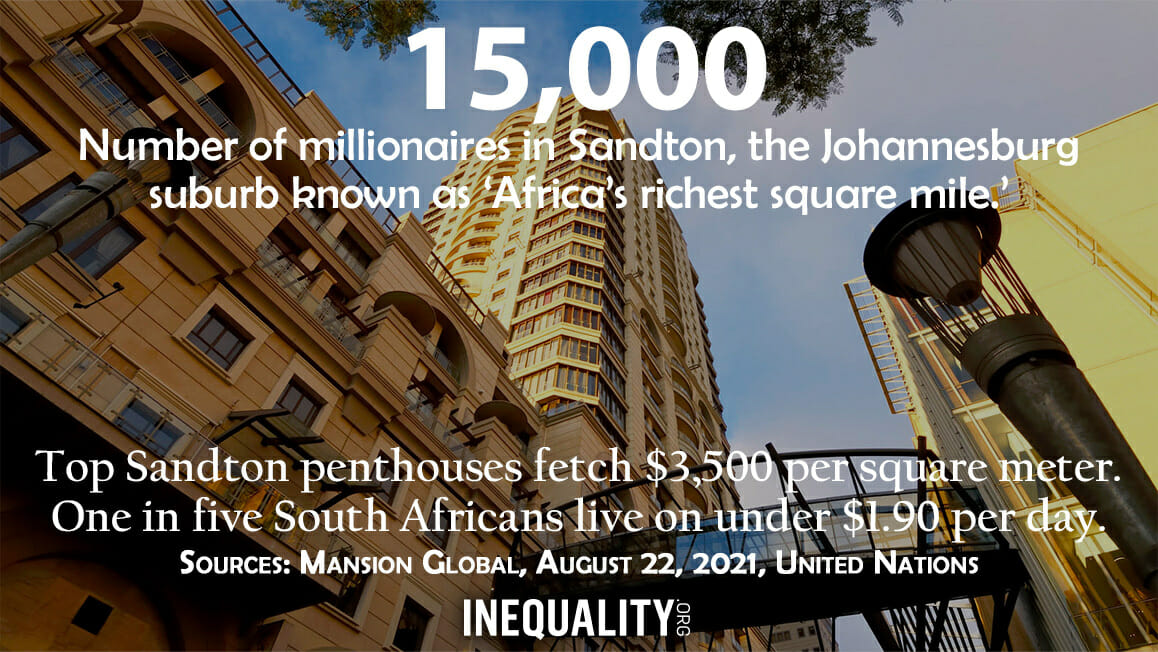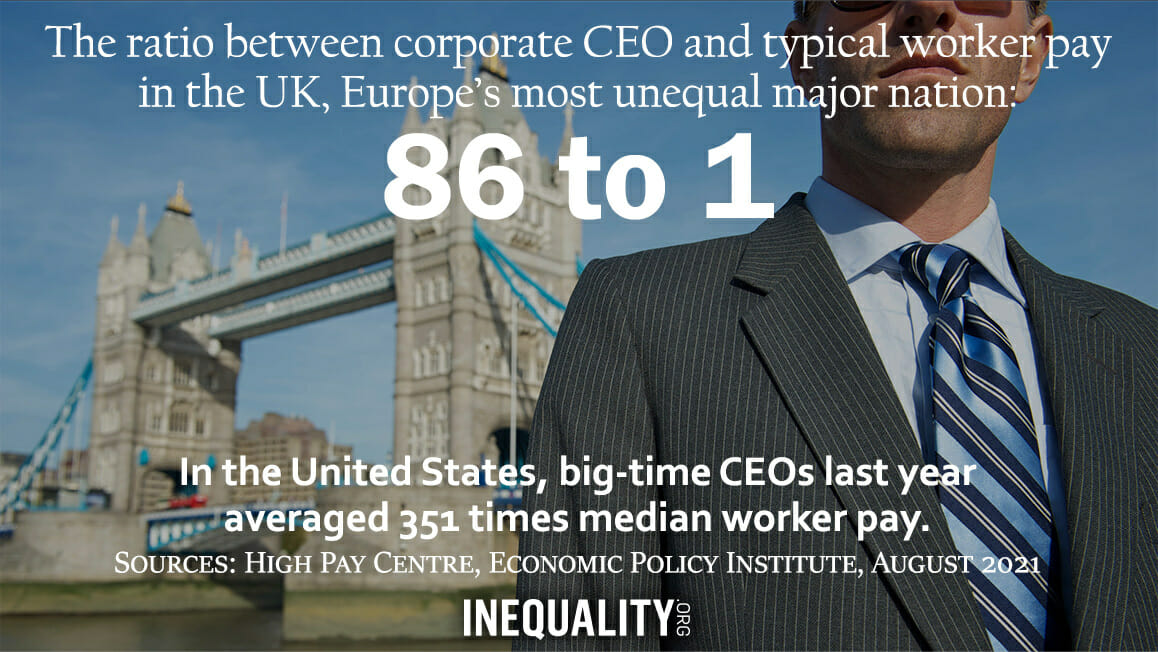| THIS WEEK |
Can you believe today marks our second pandemic Labor Day? What a demoralizing milestone, particularly for the essential workers who continue to risk their lives for meager wages while corporate CEO paychecks grow ever fatter.
Want to know what’s lifted our spirits? The conversations we’ve had over the past few weeks with nine inspiring Black labor leaders. As detailed below, Black workers are facing particularly severe challenges under Covid, and yet these leaders are finding hope in the growing support for union rights and promising federal budget proposals that would make a real difference in the lives of workers of color.
Another spirit lift: Our co-editor Chuck Collins, in today’s edition of The Hill, has some insights well worth a read on pending “tax the rich” reforms that could pay for those budget proposals. And Sarah Anderson and Brian Wakamo have just published 10 charts that sum up the state of U.S. workers this Labor Day.
Rebekah Entralgo,
for the Institute for Policy Studies Inequality.org team
|
|
| |
|
| INEQUALITY BY THE NUMBERS |
 |
|
|
|
| |
|
| FACES ON THE FRONTLINES |
 |
| Realizing the Labor Day Dreams of Black Workers |
| Black workers have borne the pandemic brunt. How can we make the recovery more equitable — and improve conditions for Black workers before the next crisis hits? We put that question to nine Black labor leaders. Among them: representatives of the AFL-CIO, SEIU, and the American Postal Workers Union, as well as activists from alternative worker support groups, including Jobs With Justice, Restaurant Opportunities Centers (ROC) United, the National Domestic Workers Alliance, and the National Black Worker Center. Some of those we contacted feel hopeful about pending federal budget proposals to invest in good care jobs, a key sector for Black women. Nearly everyone who talked with us is emphasizing the need to strengthen collective bargaining rights, a goal that became even more urgent after Amazon earlier this year crushed a Black-led organizing drive in Alabama. |
|
| |
|
| WORDS OF WISDOM |
 |
|
|
|
| |
|
PETULANT PLUTOCRAT
OF THE WEEK |
 |
| One Last Deep-Pocket Move to Profit Off Afghans |
| Will billionaire military contractor Erik Prince stop at anything to make a buck? Appears not. The 52-year-old spent the last days of the U.S.-based Afghan government, the Wall Street Journal reports, hawking tickets on a charter plane out of Kabul at $6,500 a pop, with the price higher for evacuees who needed transit to the airport. A bit earlier in the Afghan conflict, during the Trump years, Prince had proposed a $5-billion plan to privatize the war. Advisers convinced Trump not to bite on that, but The Donald later showed his gratitude by pardoning four agents in Prince’s Blackwater private army convicted in the 2007 attack that killed 17 Iraqis. Last week, White House press chief Jen Psaki expressed the Biden administration’s distaste for Prince’s pricey tickets, noting she didn’t think anyone with “a heart and soul” could “support efforts to profit off of people’s agony and pain.” Prince fired back on Fox, railing against “how quickly America abandoned its friends in Afghanistan.” |
|
| |
|
| BOLD SOLUTIONS |
 |
| Make Beverly Hillbillies Pay Their Fair Share |
| The 1970s Beverly Hillbillies sit-com followed the Clampetts, a rural clan that upscaled into a LA mansion — surrounded by snooty rich neighbors — after hitting oil on their hardscrabble farm. Under current law, if the fictional Elly May Clampett had inherited that oil-rich property after her pa died, she would’ve owed zero in capital gains taxes. President Biden and leading Democrats have a plan to close that loophole for the rich to pay for urgent public investments. But deep-pocket, dark-money donors are bankrolling an opposition campaign, falsely claiming this reform would devastate family farmers. In a recent op-ed, Institute for Policy Studies tax experts Bob Lord and Sarah Anderson make clear the reform’s real targets: the dynastic wealthy and families like the Clampetts that sell assets that have ballooned in value — not farm families that love their rural way of life and have no intention of selling out. |
|
| |
|
| GREED AT A GLANCE |
 |
|
|
|
| |
|
| TOO MUCH |
 |
| Who’s Raking Off All Your Awful Office Meetings? |
| This year’s Labor Day finds millions of Americans — those who labor in offices — almost bubbling about the prospects for an epic transformation of their workspaces. Within Corporate America, working remotely may soon become a permanent standard operating practice. Imagine that. No more horrific daily commutes. No more stressing in cramped cubicles. And, maybe most of all, no more hours spent trapped in soul-deadening corporate meeting rooms. American workers, all the polls show, simply hate meetings. Time wasted in meetings, as one Harvard analysis notes, “eats into time” for the solo work “essential for creativity and efficiency.” So why does the corporate meeting glut continue? Meetings pay — for some. Inequality.org co-editor Sam Pizzigati has more. |
|
|
|
| |
|
| MUST READS |
This week on Inequality.org
Marc Bayard, Rebekah Entralgo, and Sarah Anderson, 9 Black Labor Leaders and Advocates Reflect on the Pandemic and What Comes Next. We asked nine leading Black labor organizers and policy advocates how to advance racial equity in the Covid recovery — and beyond. .
Brian Wakamo and Sarah Anderson, 10 Charts on the State of U.S. Workers on the 2nd Pandemic Labor Day. With workers continuing to struggle under Covid, corporate lobbyists are converging on Capitol Hill to block proposed pro-labor reforms.
Bob Lord, Our ‘Trillion-Dollar Seven’: Can We Summon the Courage to Tax Them?. The billions our billionaires are grabbing currently face a next-to-nothing tax rate.
Elsewhere on the Web
Nick Buffie and Bob Lord, The American Families Plan Taxes Billionaires While Protecting Family Farms and Businesses, Center for American Progress. Cheerleaders for our rich people-friendly tax code are hiding behind family farmers to protect our billionaires.
Katrina vanden Heuvel, Tax billionaires’ pandemic profits, Washington Post. A forgotten historical truth: The United States has repeatedly relied on sharp tax increases on the wealthiest in times of crisis.
Michael Mechanic, America Is Spending a Fortune to Help Rich People Retire in Luxury, Mother Jones. How federal programs conceived for ordinary families became a piggy bank for affluent boomers.
Rhymer Rigby, To get the wealthy to pay more tax, first we need to work out why they avoid it, Financial Times. An encouraging reflection on rich people’s attitudes toward paying taxes.
Michael Roberts, The Jackson Hole dilemma. How quantitative easing has helped create a fantasy world where a very few become billionaires while working people who don’t have stocks or even houses of their own see no increase in real incomes or wealth.
Nicholas Shaxson, Private equity is draining British business dry, Guardian. Many of the tricks in private equity’s toolbox serve just to redistribute the pie upwards, deepening inequality and sapping growth.
Helen Russell, This is how much money you need to be happy, Science Focus. Researchers have found that the wealthier we become, the less we care about other people’s problems and feelings.
Michael Cohn, Over $1B in donor-advised funds went to other DAFs, Accounting Today. New report finds that Donor-Advised Funds — a tool the wealthy use to claim tax write-offs for charitable contributions — are transferring money between funds instead of disbursing it to charity.
Daniel Ziffer, CEO pay ratio: The small number that could change a lot, ABC News. In Australia, major corporate CEOs are “vigorously” disputing new figures that show they now make a scandalous 150 times what their workers earn. U.S. CEOs average 351 times their typical worker pay and think nothing of it.
Uki Goñi, Attack of the giant rodents or class war? Argentina’s rich riled by new neighbors, Guardian. Hordes of capybaras have taken up residence at a high-end gated enclave in Buenos Aires, sparking a debate on the environment and inequality.
Xi Jinping’s talk of ‘common prosperity’ spooks the prosperous, Economist. Xi is channeling Confucius: Wise leaders worry about inequality. The opposition seems stuck on the Laffer Curve.
Alex Shephard, The Plutocratic Takeover of European Soccer Is Nearly Complete, New Republic. Worldwide, different sports, same story: Richest clubs are playing with Monopoly money and leaving everyone else in the dust. |
|
| |
|
| A FINAL FIGURE |
 |
|
|
|
| |
|
| BE THE 1% (NO, NOT THAT 1%) |
 |
Our goal for 2021: that 1% of our Inequality.org subscribers become monthly sustainers and help grow our newsletter and research efforts. Be the 1%, for as little as $3 a month! |
|
|
|
| |
|
|